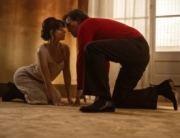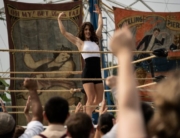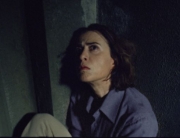These days, nothing is more addictive than an English period piece, filled with Upstairs, Downstairs–esque goings-on, social climbing, talk of husband hunting and inheritances, with acerbic but witty dialogue. Add the theme of race and you’ve got an intriguing spin on an already juicy narrative. Based on the true story of Dido Elizabeth Belle Lindsay, a mixed race woman who was the result of an illegitimate union between an upper-class English nobleman and a black woman in 18th-century England, Belle does just that.
The film opens with the newly orphaned Dido, at age six or seven, meeting her father, who treats her with love and kindness, though he’s only a part of her life for a few hours. Dido is left in the care of her great uncle and aunt, Lord and Lady Mansfield (Tom Wilkinson and Emily Watson), and a spinster aunt, Lady Mary Murray (Penelope Wilton), while her father serves as a naval officer. The film centers on Dido as a young woman (Gugu Mbatha-Raw), who, with her cousin, Elizabeth (Sarah Gadon), lives a sheltered existence with limited exposure to the outside world. Elizabeth’s father has remarried and decamped to Vienna, essentially abandoning her to the Mansfields. When visitors do come, Dido isn’t permitted to dine with the family due to her skin color—similarly, she’s also considered too high class to eat with the servants.
Though this seems to confuse, even upset her, Dido accepts her precarious position in the social order until the day John Davinier (Sam Reid), the son of a clergyman with aspirations to the law, comes to study under the tutelage of Lord Mansfield, a prominent judge. The perceptive Davinier tells her details about a case centering on a ship whose crew threw its cargo—slaves—overboard (either because the ship was running low on supplies or because the slaves were diseased and wouldn’t command a high price at market). The key question at the heart of the Zhong matter is whether the insurers should be made to pay for the loss of the cargo. Centuries ahead of his time, the passionate, iconoclastic Davinier believes fervently that no price should be put on human life, and he wastes no time in opening Dido’s eyes to the injustice that surrounds her.
The action picks up further when the family leaves for London: Elizabeth, whose father has left her nothing, must go husband hunting, while Dido, whose father has died, leaving her a substantial inheritance, is told that she has no need to do so. Though this puts her in an even more interesting position—inferior because of race and gender yet independent and far more powerful because of financial independence—Dido still finds herself enmeshed in something of a love triangle: Oliver Ashford (James Norton), a suitable, if typically close-minded, match from an upstanding family is entranced, while Davinier holds a different of allure.
Though this is a gorgeous film, the story never quite matches the visuals. Belle is a paint-by-numbers period drama, full of the requisite social maneuvering. Characters trade barbed comments that feel both too self-conscious and overwritten. In one scene, Belle tells Oliver’s far more bigoted brother, James (played by Tom Felton, aka Harry Potter’s Draco Malfoy, who fairly oozes slimy, upper-crust entitlement), that his manners are poorer than his brother’s finances. Their mother, the conniving Lady Ashford (Miranda Richardson, who clearly plays the part of the villainous with relish), gets in a few enjoyably cruel one-liners herself at Dido’s expense.
However, the overall effect is a watered down Gosford Park. Characters have a tendency to throw remarks about social conventions or customs that doesn’t quite ring true. Would Elizabeth, for instance, really end a conversation on marriage with Dido by sagely intoning that women are seen as property?
Similarly, the examination of race stays equally shallow—a disappointment, as this provocative subject matter holds much promise. The film uses lingering shots of Dido staring at portraits of aristocrats alongside black slaves as a heavy-handed device to emphasize her feelings of uncertainty and alienation. Moreover, her exposure to English society is restricted to her interactions with the sensitive and almost implausibly progressive Davinier on one hand and, on the other, the prejudiced Lady Ashford and James Ashford, who trade snide comments just out of earshot (Oliver, though well meaning, sees Dido as an exotic flower whose allure shines through despite her mixed parentage).
Casting those who would look down on Dido as laughable villains comes across as naive; it’s unlikely Dido would encounter many—if any—as open-minded as Davinier. The film does, though, delve into Dido’s family and their feelings toward her. Wilkinson, in particular, conveys genuine pain and confusion as he tries to both ensure happiness for his adopted daughter as well as act in a manner befitting his social position. While Belle attempts to channel Jane Austen with a side of social justice, it goes for the obvious, positively hammering home lessons about race.
Despite the film’s limitations, Mbatha-Raw is a delight to watch. Beautifully expressive, she conveys authentic emotion easily and without affectation, making up for the script’s lack of subtlety. Those who can get past the film’s flaws should find Belle an enjoyable and well-paced if superficial costume drama. Viewers looking for a richer intersection of race, gender, and social class, however, will likely be disappointed.

















Leave A Comment